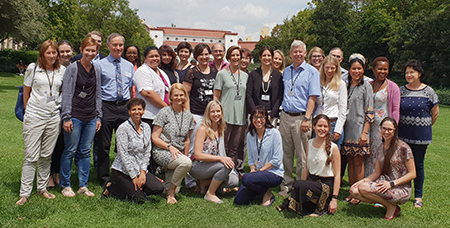Any tertiary-education institution worth its salt has an obligation towards its community to uplift and develop by offering relevant training and conducting research that will be to the benefit of the country’s citizens.
The North-West University’s (NWU’s) Faculty of Health Sciences recently engaged in yet another initiative to help ensure that South Africa’s youngest children receive the care they need to survive and thrive.
The faculty’s Centre of Excellence for Nutrition joined hands with the international project for improving early nutrition and health in South Africa (ImpENSA), which is funded by the European Union.
The aim of ImpENSA is to strengthen relations between higher education and the wider social environment through the exchange of state-of-the-art practices.
The NWU’s Prof Lize Havemann-Nel, South Africa’s ImpENSA project coordinator, says they will offer training courses to healthcare professionals with the focus on the importance of micronutrients in the first 1 000 days of life.
“The project will develop and implement a blended learning programme that will enable healthcare staff to effectively communicate healthcare messages and support pregnant women and caregivers of children in the first two years of life.”
She says they are focusing on the first 1 000 days of babies’ lives because this particular time plays a huge role in shaping their future. “This is the period from conception until a child’s second birthday, which offers a unique window of opportunity to shape a healthier and more prosperous future.”
She says the educational message that prospective parents should indeed be thinking about their life choices and health before they become pregnant needs to be communicated more extensively.
“The right decisions about nutrition, the environment, and the safety of and support for the pregnant mother play a key role in determining a baby’s future happiness and success. Good nutrition is essential to ensure you are healthy during pregnancy, and that your baby is born with a strong body and smart brain. During pregnancy, babies draw all their nutrients from their mother. If the mom lacks key nutrients, so will her baby, putting the child’s future health and development at risk.”
Six staff members from the NWU recently engaged in a planning session held at the Ludwig Maximilian University in Munich, Germany, where detailed plans for the roll-out of the training courses were discussed. Results from the focus group discussions and a scoping analysis on the current training programmes and policies were used to prepare the curriculum for the different modules of the training course.
The ImpENSA team consists of consortium members from three higher education institutions in Europe and three in South Africa (of which the NWU is one), and two boards for health professionals in South Africa.
According to the faculty’s deputy dean for research and innovation, Prof Jeanetta du Plessis, this project fits the faculty like a glove. “We direct our programmes and activities towards the pursuit of relevant knowledge and innovation in health sciences in order to promote and improve the health of the population of South Africa, Africa and the world via education, research, services and community involvement. We are therefore proud to be associated with this initiative,” she says.
For more information about the roll-out of the training courses, please contact Estelle Strydom on estelle.strydom@nwu.ac.za or +27 18 299 2399.

The NWU’s Faculty of Health Sciences wants to ensure that South Africa’s youngest children receive the care they need to survive and thrive.
